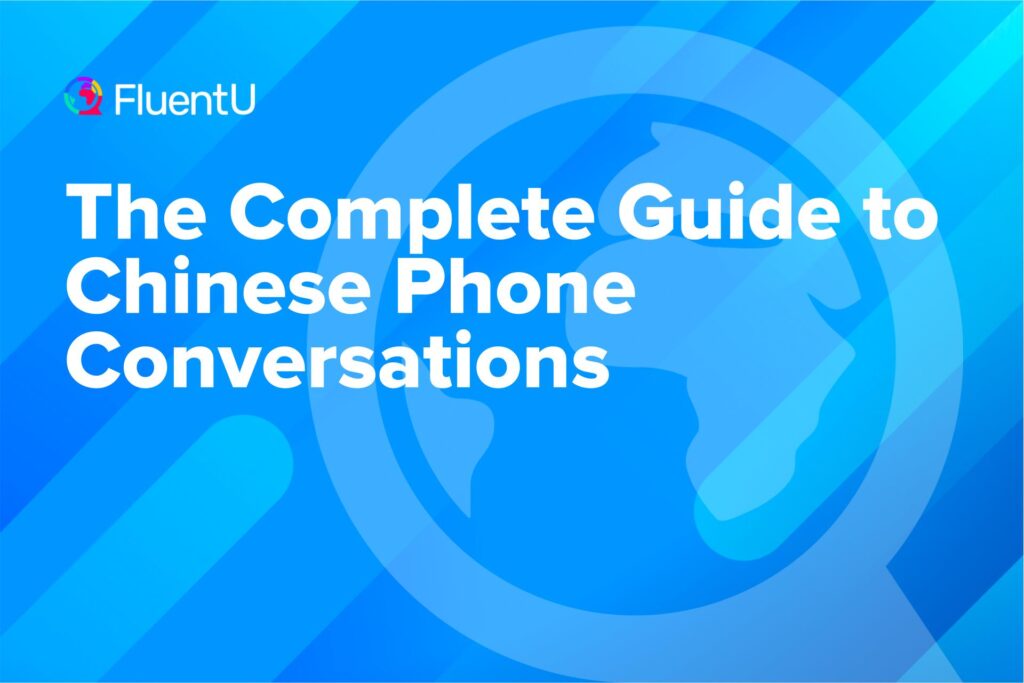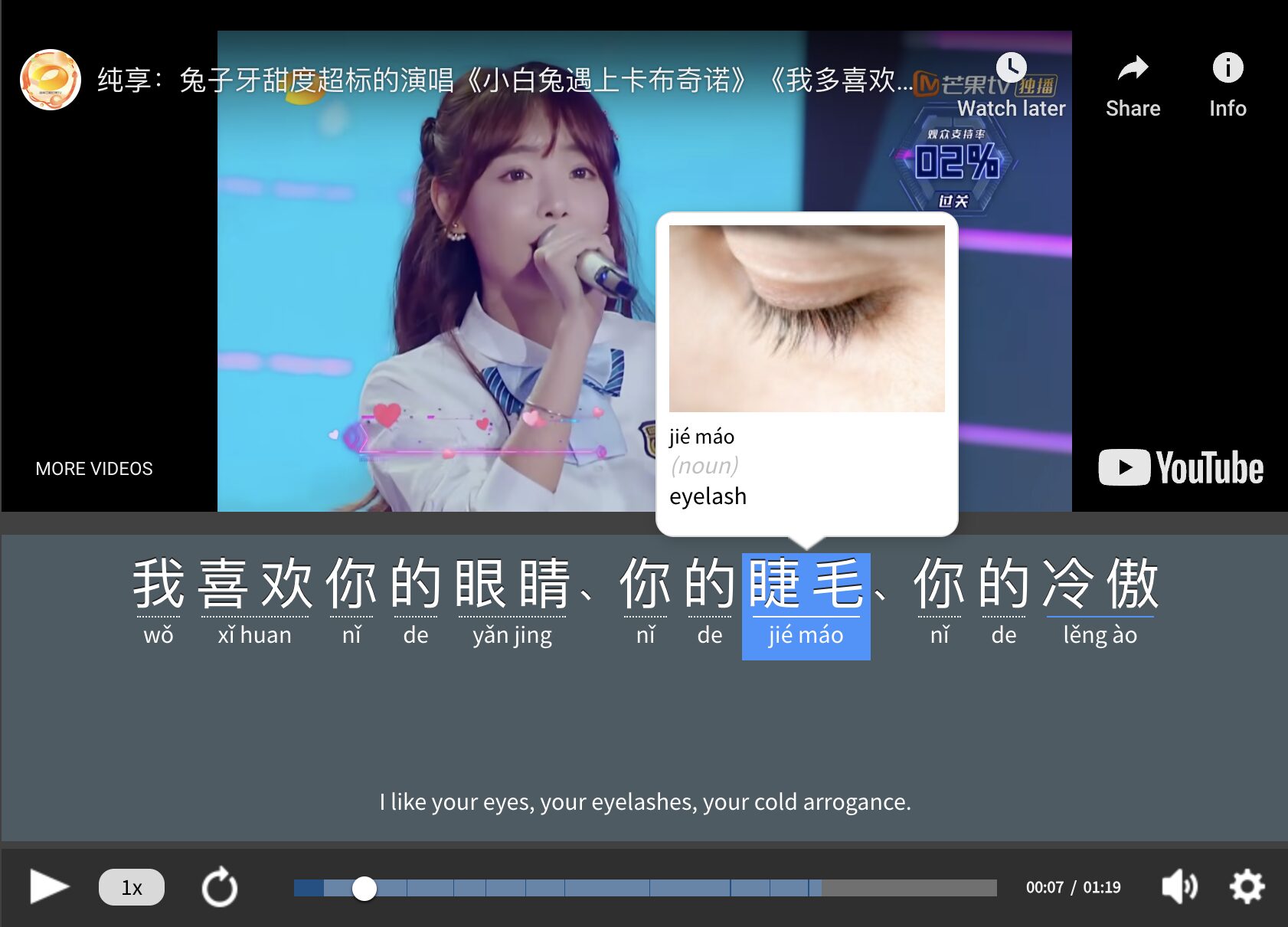Contents
- Basic Words and Phrases for Chinese Phone Conversations
- How to Answer a Phone Call in Chinese
- How to Ask Someone to Speak Slower in Chinese
- How to Make Confirmations on the Phone in Chinese
- How to Text in Chinese
- How to Say Goodbye When Hanging Up
- Why It’s Important to Learn Chinese Phone Vocabulary
- And one more thing...
The Complete Guide to Chinese Phone Conversations

The first phone I had while living in China was a terrifying, pre-pay “burner” phone that screeched the number of the caller every time it rang. And the person on the other hand was a courier, someone chasing a bill or my landlord—a Chinese person who expected to speak in Chinese.
When you’re learning a new language and living in a foreign country, you develop a love/hate relationship with your phone. Here, I’ll give you a complete guide to having a Chinese phone conversation confidently.
Download: This blog post is available as a convenient and portable PDF that you can take anywhere. Click here to get a copy. (Download)
Basic Words and Phrases for Chinese Phone Conversations
Before you can talk on the phone, you’ll need some simple words and phrases to get you started. They’re pretty intuitive and simple. Let’s look at some right now:
| Chinese | Pinyin | English |
|---|---|---|
| 打电话 | dǎ diàn huà | To make a phone call |
| 电话 | diàn huà | Phone |
| 接电话 | jiē diàn huà | To answer a call or answer the phone |
| 挂电话 | guà diàn huà | To hang up |
| 发短信 | fā duǎn xìn | To send a text message |
| 莉莉在不在 | lì lì zài bù zài? | Is Lily there? |
| 我是丽丽 | wǒ shì lì lì | This is Lily |
| 手机 | shǒu jī | Cell phone |
| 电话号码 | diàn huà hào mǎ | Phone number |
| 你打错了 | nǐ dǎ cuò le | You called the wrong number |
| 重拨 | chóng bō | To redial |
| 静音 | jìng yīn | Mute |
| 免提 | miǎn tí | Speakerphone |
| 录音 | lù yīn | Recording |
| 转接 | zhuǎn jiē | To transfer (a call) |
| 呼叫等待 | hū jiào děng dài | Call waiting |
| 语音信箱 | yǔ yīn xìng xāng | Voicemail |
| 留言 | liú yán | To leave a message |
| 请留言 | qǐng liú yán | Please leave a message |
| 回电话 | huí diàn huà | To call back |
| 请给我回个电话 | qǐng gěi wǒ huí gè diàn huà | Please call me back |
How to Answer a Phone Call in Chinese
In Chinese, we don’t answer the phone with 你好 (nǐ hǎo). Instead, we use the word 喂 (wèi), which is a way of saying hello, but only over the phone. Note that even though it technically has a fourth tone, it’s pronounced with the second tone when answering a call.
To express agreement and acknowledge that you’ve heard what the other person is saying, a common expression to use both on the phone and in person is 好了 (hǎo le) — all right.
When something is agreed upon—like a time and a place to meet— 好的 (hǎo de) — okay, is an easy expression to use.
Here are some more survival phrases for answering phone calls in Chinese that will come in handy:
| Chinese | Pinyin | English |
|---|---|---|
| 喂? 您是哪位? | wèi? nín shì nǎ wèi? | Hello, who is this? |
| 你说 | nǐ shuō | Go ahead |
| 请讲 | qǐng jiǎng | Please speak |
| 您好,请问您找谁 | nín hǎo, qǐng wèn nín zhǎo shuí | Hello, who are you looking for? |
| 这里是... | zhè lǐ shì... | This is... |
| 请问您是 | qǐng wèn nín shì | Who is this? (formal) |
| 您拨打的电话... | nín bō dă de diàn huà... | The number you dialed... |
| 您所拨打的电话暂时无人接听 | nín suǒ bō dă de diàn huà zàn shí wú rén jiē tīng | The number you dialed is not available |
| 对不起,您拨错号了 | duì bu qǐ, nín bō cuò hào le | Sorry, wrong number |
| 请稍等 | qǐng shāo děng | Please wait |
| 对方正在通话中 | duì fāng zhèng zài tōng huà zhōng | The other party is busy |
You can learn both formal vocabulary and natural conversational words and phrases by using an immersive program like FluentU.
FluentU takes authentic videos—like music videos, movie trailers, news and inspiring talks—and turns them into personalized language learning lessons.
You can try FluentU for free for 2 weeks. Check out the website or download the iOS app or Android app.
P.S. Click here to take advantage of our current sale! (Expires at the end of this month.)
How to Ask Someone to Speak Slower in Chinese
I woke up in my hotel room to the sound of a phone ringing. Answering, it took me a few moments to remember where I was: I’d just arrived in Xi’an late the night before. The person on the other end was speaking Chinese quickly. I seemed to know the words, but my brain wasn’t making sense of them fast enough.
Still half asleep, I managed to conjure the phrase:
不好意思,我是外国人,请说慢一点儿。
(bù hǎo yì si, wǒ shì wài guó rén, qǐng shuō màn yī diǎn er.)
Excuse me, I’m a foreigner, please talk a little slower.
That seemed to do the trick. The person on the other end cut her speed in half and repeated her sentence. It was a good thing she did (she was calling from the airport). My luggage—which had been lost in Chongqing—had arrived, and I had to make arrangements to pick it up.
As with most languages, Mandarin native speakers tend to talk quickly. With a phone conversation, they’re usually not going to immediately know that you’re new to the language. Especially if the call is complex or catches you unaware (landlords have a special talent for this).
Here are a few more phrases you can use when you don’t understand something:
| Chinese | Pinyin | English |
|---|---|---|
| 说慢一点 | shuō màn yī diǎn | Speak slower |
| 再说一遍 | zài shuō yí biàn | Say that again |
| 你可以再说一遍吗? | nǐ kě yǐ zài shuō yī biàn ma? | Could you say that again? |
| 不好意思,我没听清楚。 | bù hǎo yì sī, wǒ méi tīng qīng chǔ | Sorry, I didn't hear clearly |
| 请你再说慢一点 | qǐng nǐ zài shuō màn yī diǎn | Please speak more slowly |
| 你说什么? | nǐ shuō shén me? | What did you say? |
| 我不太明白你的意思 | wǒ bù tài míng bái nǐ de yì si | I don't quite understand what you mean |
| 你可以解释一下吗? | nǐ kě yǐ jiě shì yī xià ma? | Could you explain it? |
| 麻烦你重复一下 | má fán nǐ chóng fù yī xià | Please repeat that |
| 你可以换个说法吗? | nǐ kě yǐ huàn gè shuō fǎ ma? | Can you say it differently? |
| 你是说...吗? | nǐ shì shuō...ma? | Are you saying...? |
| 我确认一下,你是说...对吗? | wǒ què rèn yī xià, nǐ shì shuō...duì ma? | Let me confirm, you're saying...? |
How to Make Confirmations on the Phone in Chinese
Okay, so now you know how to make sure you understand them, but that’s only half the conversation! Since Mandarin Chinese is a tonal language and contains sounds that are unfamiliar in English, it’s all too easy to misspeak. For important conversations—or even if you’re just arranging to meet for a beer—asking the right questions ensures your message is received.
Here are a couple of “quick and dirty” ways to ensure you’re both on the same page and confirm your arrangements. Repeat what the other said then tag these phrases at the end to make sure you understand.
| Chinese | Pinyin | English |
|---|---|---|
| 是不是 | shì bù shì | Isn't it? |
| 可不可以 | kě bù kě yǐ | Is that okay? |
| 对不对 | duì bù duì | Right? |
| 真的吗? | zhēn de ma? | Really? |
| 确定吗? | què dìng ma? | Are you sure? |
| 你确定? | nǐ què dìng? | You're sure? |
| 明白吗? | míng bai ma? | Do you understand me? |
| 清楚吗? | qīng chǔ ma? | Clear? |
| 正确吗? | zhèng què ma? | Correct? |
| 没问题吗? | méi wèn tí ma? | No problem? |
| 我确认一下... | wǒ què rèn yī xià... | Just to confirm... / Let me confirm... |
You may sound a bit pedantic rephrasing your arrangements, but trust me—it’s better than showing up on the wrong day or having your luggage delivered to the apartment down the street.
How to Text in Chinese
Handwriting Chinese characters is notoriously difficult, but sending a text is remarkably easy. Even if the idea of talking live on the phone still seems daunting, having a full-on text conversation is probably much easier than you think. Unlike the live phone call, you have time to think and look up strange words in the dictionary.
To successfully text in Chinese, you’ll need:
- A basic grasp of Chinese grammar rules.
- A smartphone with a Chinese keyboard installed (here’s how to activate yours if you have an iPhone).
- A WeChat (微信 — wēi xìn) account and app since this is what everyone in China uses. It’s like Facebook, WhatsApp and eBay all rolled into one. It’s also really great for practicing all your Chinese skills.
- Pleco, which is a marvelous Chinese dictionary app. You text in Chinese by writing in pinyin. So, text in English letters and your phone will suggest the most appropriate characters. This is normally pretty reliable, but if you don’t recognize one particular character, or you aren’t sure which one to click, just copy your message into Pleco before you send. When the reply comes, you can also copy and paste it right into Pleco to check your translation and save any unfamiliar words.
How to Say Goodbye When Hanging Up
There are several different ways to say goodbye when hanging up—in all languages. Depending on the situation, you might want to use one more than the other. Here’s a list of some common ways to end a phone call in Chinese in various contexts:
| Chinese | Pinyin | English |
|---|---|---|
| 挂了 | guà le | I'm hanging up |
| 谢谢,再见 | xiè xiè, zài jiàn | Thank you, goodbye |
| 拜拜 | bai bai | Bye-bye (informal) |
| 回头聊 | huí tóu liáo | Talk to you later |
| 就这样吧 | jiù zhè yàng ba | That's it then |
| 麻烦您了,再见 | má fan nín le, zài jiàn | Thank you for your trouble, goodbye |
| 打扰了,再见 | dǎ rǎo le, zài jiàn | Sorry for bothering you, goodbye |
| 我还有事,先挂了 | wǒ hái yǒu shì, xiān guà le | I have something else to do, I'll hang up first |
| 好了好了,挂了 | hǎo le hǎo le, guà le | Okay, okay, I'm hanging up |
| 我先挂了啊 | wǒ xiān guà le a | I'll hang up first, okay? |
| 下次再聊,拜拜 | xià cì zài liáo, bai bai | Talk to you next time, bye-bye |
Why It’s Important to Learn Chinese Phone Vocabulary
- You can’t rely on visual cues. Speaking Mandarin Chinese on the phone is harder than in person. First of all, you lack the visual element—you can’t resort to universal gestures, or take out your smartphone and defer to a translation app. You can point all you want, but that won’t help the person on the other end of the line understand what you’re saying.
- Keep the conversation going. Talking on the phone also adds an element of pressure to fill the silence and keep the conversation flowing. If your vocabulary is limited, this can seem terrifying.
- Alleviate the anxiety. Over time, I learned that Chinese phone conversations don’t need to be that scary. The disembodied voice in fact belongs to a rational human being who is willing to slow down, hear you out and make themselves understood. These terms will help you control the conversation so that you always know what’s going on.
Before you know it, you’ll be having long, useful phone conversations in Chinese. Order food with confidence, deal with that pesky landlord and broaden your social life.
Download: This blog post is available as a convenient and portable PDF that you can take anywhere. Click here to get a copy. (Download)
And one more thing...
If you like learning Chinese at your own pace and from the comfort of your device, I have to tell you about FluentU.
FluentU makes it easier (and more fun) to learn Chinese by making real content like movies and series accessible to learners. You can check out FluentU's curated video library, or bring our learning tools directly to Netflix or YouTube with the FluentU Chrome extension.
One of the features I find most helpful is the interactive captions—you can tap on any word to see its meaning, an image, pronunciation, and other examples from different contexts. It’s a great way to pick up vocab without having to pause and look things up separately.
FluentU also helps reinforce what you’ve learned with personalized quizzes. You can swipe through extra examples and complete engaging exercises that adapt to your progress. You'll get extra practice with the words you find more challenging and even be reminded you when it’s time to review!
You can use FluentU on your computer, tablet, or phone with our app for Apple or Android devices. Click here to take advantage of our current sale! (Expires at the end of this month.)











